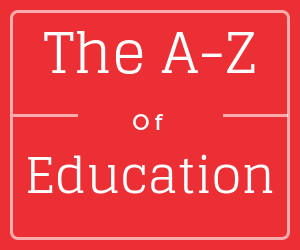The A-Z of Education: The Philosophy of Education

In this series, I hope to guide you in acquiring the vocabulary that you need to know to be considered a competent education professional. In this article, we will discuss education vocabulary centered on the philosophy of education.
Click here to view all of the articles in the series.
Alienation denotes a society that is organized into classes based on what they do or do not own.
American Exceptionalism is the idea that the United States is a special country with a manifest destiny.
Axiology is the branch of philosophy that considers the study of fundamental principles.
Behaviorism is the perspective that because behaviors are caused by experiences, altering circumstances will alter behaviors. (Also known as Behavior Modification)
Classical Conditioning is another term for conditioned behavior, a behavior that responds to a stimulus that doesn’t normally cause that reflexive response.
Classical Idealism is a branch of Idealist philosophy searching for the absolute truth. It is the theories of the renowned Western philosophers Socrates and Plato (427–347 BC), who were searching for an absolute truth.
Classical Realism is a branch of Realist philosophy that suggests that matter is real and that it is separate from our perceptions.
Cognitive Psychology, also known as constructivism, is the perspective that students “build” their knowledge as new experiences are linked to previous experiences.
Conception of Property and the Government is the liberalist notion that government shouldn’t interfere with business transactions.
Conceptualization of Ideas refers to the knowledge acquired through big ideas that allow us to understand the world around us.
Conditioned Behavior refers to a behavior that responds to a stimulus that doesn’t normally cause that reflexive response. (Also known as “reflexive conditioning” or “classical conditioning.”)
Conservatism is the belief that institutions should function according to their intended original purpose and any concepts that have not been maintained should be restored
Constructivism is the perspective that students “build” their knowledge as new experiences are linked to previous experiences. (Also known as Cognitive Psychology.)
Critical Theory is a philosophy of education that analyzes institutions, organizations, and instruction in terms of power relationships.
Deconstruction Method is a process of criticizing literary text, philosophical text, and political theory. It entails a breakdown of the rational purposes, or logos, of earlier Western philosophy that was believed to govern the universe.
Deductive Reasoning is reasoning that allows a person to think from general principles to a specific event.
Dialectical Epistemology is continuing to engage in class conflict and struggle and materialism.
Dialectical Materialism is the combination of materialism and realism with the Idealist idea of dialectical change. It perceives society as a developing and constantly changing network of human relationships that have economic consequences.
Educating for General Citizenship refers to the Liberalist belief that we should educate everyone equally and in preparation to become a political leader.
Episteme are the assumptions that contribute to a society at a particular time in history.
Epistemology is the branch of philosophy that contemplates how people come to learn what they know.
Equalitarian refers to aspiring to the doctrine that all human beings are equal; a less common word for egalitarian.
Essentialism is a philosophy of education that consists of core knowledge in reading, writing, math, science, history, foreign language, and technology.
Ethno-nationalism refers to loyalty to an ethnic or racial group rather than to a nation.
Existentialism is the philosophy that accentuates attentive personal consideration about one’s character, beliefs, and choices. The primary question existentialists ask is whether they want to define who they are themselves, or whether they want society to define them.
Existentialist Phenomenology concludes that we construct our own truths from within, as opposed to the previous theories of one universal truth.
Experimentalism is a conjecture that the earth is still in process and is still becoming, so that there is no absolute truth.
Forms of Good refers to a belief by Plato who arranged his ideas, referred to as “forms,” in a hierarchy with the greatest of all forms being the Forms of Good.
Global Communication Processes are how information is delivered. Television, email, Internet, newspapers, and textbooks are all sources of Globalization Communication
Global Economic Processes involve all aspects of buying and selling goods and services across the globe.
Global Educational Processes are the process by which schools and universities are expected to “compare and compete” globally. The World Bank fosters to the globalization these institutions by adjusting policies for less technologically developed countries.
Global Political Processes are the process by which government and officials are expected to “compare and compete” globally. The World Bank fosters to the globalization these institutions by adjusting policies for less technologically developed countries.
Globalization is the process that promotes worldwide participation and relationships between people of different countries, cultures, and languages.
Great Works are works of literature written by history’s finest thinkers that transcend time and never become outdated.
Historical Materialism is an analysis of capitalism.
Humanistic Psychology is a philosophy that focuses on the value and meaning of education rather than the dissemination and attainment of facts.
Idealism is a major school of thought in educational philosophy, of which the underlying principle is that reality is mostly spiritual. It is the belief that physical things exist only in the mind.
Individualism is the Liberalist belief that individuals retain inherent human rights that the social order cannot give or take away.
Inductive Reasoning refers to reasoning that allows a person to think from that specific event back to what the general principle was that caused the event.
Information Processing refers to how the brain processes information by attending to stimuli, and receiving, storing, and retrieving information.
Liberalism is the ideology that people should enjoy the greatest possible individual freedom and that it should be guaranteed by due process of law.
Life-Affirmation involves questioning even the most socially acceptable doctrines, such as Christianity and morality.
Logic is the branch of philosophy that looks to bring organization to the reasoning process.
Marginalize refers to taking or keeping somebody or something away from the center of attention, influence, or power.
Marxism is an ideological and political movement that focuses on the class system as a form of conflict within the social, political, and educational realms.
Metaphysics is the branch of philosophy that considers questions about the physical universe.
Modern Idealism is a branch of Idealist philosophy that believes in a material world and a world of the mind. It implies that since a man is thinking that he must exist. It further questions existence and how we came to be, concluding that some form of deity must be present that allows us to exist.
Modern Realism is a branch of Realist philosophy that suggests that everything we know comes from experience and reflecting on that experience. We are not born with any innate or preconceived ideas, but rather are a blank slate.
Nationalism is a national spirit, a love of one’s country, and the emotional ties to the interests of a nation and the symbols that represent it.
Operant Conditioning is a behavior conditioned by reinforcement for performing desired actions rather than causing reflexive behaviors.
Paideia Program refers to a Perennialist program developed from the book The Paideia Proposal. It is based on the Great Works of literature, and has been implemented by hundreds of schools in the United States.
The Paideia Proposal is a book that was written by Mortimer Alder in 1982, which described a system of education based on the Great Works. The book inspired the school model referred to as the “Paideia Program.”
Perennialism is a philosophy of education that asserts that certain notions transcend time and are predominantly found in the great literature of the ages.
Philosophy of Education Statement is a written description of what we interpret the best approach to education to be.
Postmodernism is a major school of thought in Educational Philosophy that describes the cultural changes to philosophy that are caused by present-day information such as from contemporary literature, feminism, and art.
Pragmatism is a major school of thought in Educational Philosophy, which concludes that our ideas serve a purpose and that we seek out that purpose by solving problems and considering what the consequences may be.
Problem-Solving Method is the method developed by John Dewey that deduces that people think in order to solve problems, and lists the steps used to search for absolute truth. The steps include: recognizing that there is a problem, clearly defining a problem, suggesting possible solutions, considering possible consequences, and observing and experimenting to either accept or reject the idea as an absolute truth.
Progress and Representative Political Institutions refer to the Liberalist belief that holds that liberation of human rights will lead to improving the human condition.
Rationality and the Power of Reasoning refers to the belief that most people can be reasonable, and that teachers need to use teaching methods that build and support the ability to rationalize and use their intelligence
Realism is a major school of thought in Educational Philosophy that is the notion that the world exists “because it does.”
Reflexive Conditioning is another term for conditioned behavior: a behavior that responds to a stimulus that doesn’t normally cause that reflexive response.
Religious Idealism is the branch of Idealist philosophy that theorizes two separate worlds: a world of God and a world of humanity. These two worlds are separated by sin, and the soul is the bridge to rejoin the world of God.
Religious Realism is the branch of Realist philosophy that presumes that God is pure reasoning, which is the truth of all things. Religious Realists believe the sole purpose of existence is to reunite the soul with God.
Scaffolding is a constructivist technique of “constructing meaning.”
Schemata are how we organize our knowledge that allows us easy access to memories that haven’t been used in some time.
Secularism is the belief in the strict enforcement of the separation of church and state.
Social Reconstructionism is the perspective that schools are the organization that should be used to solve society’s problems.
Society-Centered Philosophies go beyond focusing on strictly the teacher or the student, and focus on a group or a people instead. Whether it is a minority group or the world as a whole, society-centered philosophies focus on educating a group of people rather than a curriculum or a student.
Socratic Method is the process of gaining knowledge by carefully questioning and then criticizing the answers.
Socratic Seminars are lectures in which the teacher asks a specific series of questions in order to encourage the students to think, rationalize, and discuss the topic.
Student-Centered Philosophies refer to philosophies that focus more on educating students individually. They place more emphasis on the individuality of the students and helping them to realize their potential.
Teacher-Centered Philosophies are philosophies that pass knowledge on from one generation of teachers to the next. In teacher-centered philosophies, the job of the teacher is to impart a respect for authority, determination, a strong work ethic, compassion for those around us, and sensibility.
Are there any terms that we missed?





